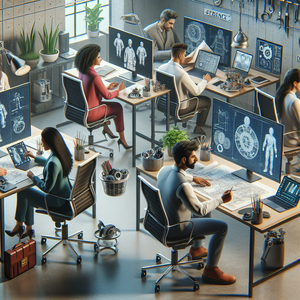Freelance Engineering in the Age of AI

The influence of AI on engineering is profound. Automation of repetitive tasks is one of the most notable benefits, allowing freelance engineers to enhance productivity and focus on more intricate project components. For example, AI-driven software tools, like Autodesk’s AutoCAD, now feature intelligent design aids that can suggest modifications and detect errors before they escalate into costly mistakes. This shift not only accelerates the design process but also improves overall project quality. Furthermore, AI's capability to analyze large datasets enables freelance engineers to derive insights that were previously inaccessible. In civil engineering, for instance, predictive analytics can forecast the structural integrity of a building based on historical construction data, allowing engineers to make data-driven decisions that enhance safety and performance. Such applications underscore the importance of integrating AI into everyday engineering tasks, which can lead to more informed decision-making and ultimately better project outcomes.
Emerging Opportunities in the AI Era
The rise of AI has birthed new niches within the engineering sector, creating a wealth of opportunities for freelance professionals. Areas such as AI integration in smart devices, autonomous systems, and data-driven engineering solutions are witnessing a surge in demand. The World Economic Forum projects that the need for AI-related skills will continue to expand, making now an ideal time for engineers to pivot towards these emerging fields. For instance, freelance engineers with expertise in both electrical engineering and AI can contribute to the development of smart home technologies, where integrating machine learning algorithms into household devices is becoming increasingly common. Similarly, engineers with knowledge of AI can find lucrative opportunities in sectors like automotive engineering, where autonomous vehicles depend heavily on advanced AI systems.
Essential Skills for Freelance Engineers
To thrive in this AI-centric landscape, freelance engineers must cultivate a diverse skillset. Key skills include: 1. **Data Analysis and Interpretation**: Proficiency in data analytics tools and techniques is essential. Engineers should learn how to gather, analyze, and interpret data to harness the full potential of AI tools. 2. **AI and Machine Learning Fundamentals**: Familiarity with the principles of AI and machine learning can significantly enhance an engineer's ability to implement these technologies effectively. Online courses and certifications can provide valuable insights into these complex subjects. 3. **Adaptability and Continuous Learning**: The engineering landscape is evolving at a rapid pace, and freelancers must remain flexible and willing to learn. Pursuing continuous education through workshops, webinars, and professional development courses will help engineers stay current with technological advancements. 4. **Soft Skills**: As technology evolves, the importance of interpersonal skills grows. Freelance engineers must develop strong communication, teamwork, and problem-solving skills to effectively collaborate with diverse teams and clients.
Staying Ahead in a Rapidly Evolving Market
In a competitive freelance engineering market, building a personal brand is crucial. A well-curated online portfolio showcasing AI-driven projects can serve as a powerful marketing tool. Platforms like LinkedIn are invaluable for freelancers to connect with potential clients, share their expertise, and demonstrate their understanding of AI applications in engineering. Networking is also vital for freelancers. Engaging in industry events, online forums, and professional groups can facilitate connections that lead to new projects and collaborations. By actively contributing to discussions and sharing insights, freelance engineers can establish themselves as thought leaders in their fields.
The integration of AI into the freelance engineering space presents both challenges and opportunities. By embracing AI technologies, enhancing their skillsets, and building robust personal brands, freelance engineers can navigate this evolving landscape successfully. As the demand for AI-driven engineering solutions continues to grow, those who adapt, innovate, and remain committed to lifelong learning will not only survive but thrive in this exciting new era. The future for freelance engineers is bright, filled with potential for those ready to harness the transformative power of AI and redefine the engineering profession.
AI Integration Engineer
Google, Amazon, IBM
Core Responsibilities
Design and implement AI solutions across various engineering projects, enhancing system functionality and user experience.
Collaborate with cross-functional teams to integrate machine learning models into existing systems and workflows.
Test and evaluate AI algorithms for effectiveness and efficiency in real-world applications.
Required Skills
Strong programming skills in Python, Java, or C++ with experience in AI frameworks like TensorFlow or PyTorch.
Understanding of software development life cycles and Agile methodologies.
Experience with data preprocessing, feature engineering, and model training.
Common Employers
Tech giants like Google, Amazon, and IBM, as well as startups focusing on smart technologies.
Predictive Analytics Engineer
Core Responsibilities
Develop predictive models using machine learning techniques to forecast project outcomes and improve decision-making processes.
Analyze historical project data to identify trends and patterns that inform engineering practices.
Present findings to stakeholders in a clear, actionable format to support strategic planning.
Required Skills
Proficiency in statistical analysis tools (e.g., R, SAS) and data visualization software (e.g., Tableau, Power BI).
Strong analytical skills with an emphasis on problem-solving and critical thinking.
Familiarity with large datasets and cloud-based data storage solutions.
Common Employers
Engineering firms, construction companies, and data analytics consultancies.
Smart Device Engineer
Nest, Philips Hue
Core Responsibilities
Design and develop smart home devices with integrated AI functionalities, enhancing connectivity and user interaction.
Collaborate with hardware engineers to ensure seamless integration of software and hardware components.
Conduct user testing to gather feedback and iteratively improve product features.
Required Skills
Expertise in IoT protocols and platforms (e.g., MQTT, Zigbee) and experience with embedded systems development.
Knowledge of user interface design and experience with mobile app development for device control.
Familiarity with cybersecurity principles to ensure data protection within smart devices.
Common Employers
Companies like Nest, Philips Hue, and various startups in the smart home market.
Autonomous Systems Engineer
Tesla, Waymo
Core Responsibilities
Design and develop algorithms for autonomous vehicles, focusing on navigation, perception, and decision-making processes.
Test and evaluate AI systems in simulated and real-world environments to ensure safety and reliability.
Collaborate with interdisciplinary teams to integrate AI with mechanical and electrical systems.
Required Skills
Strong background in robotics, computer vision, and control systems.
Proficiency in programming languages like C++ and Python, along with experience in ROS (Robot Operating System).
Familiarity with regulations and standards governing autonomous vehicle development.
Common Employers
Automotive companies like Tesla, Waymo, and various robotics startups.
Data-Driven Civil Engineer
Core Responsibilities
Utilize AI and machine learning techniques to analyze structural data and predict maintenance needs for infrastructure projects.
Implement data-driven solutions to enhance project efficiency, sustainability, and safety.
Collaborate with urban planners and architects to optimize design based on predictive analytics.
Required Skills
Proficiency in civil engineering software (e.g., AutoCAD, Civil 3D) and data analysis tools (e.g., MATLAB, Excel).
Strong understanding of materials science and structural integrity principles.
Ability to communicate complex data insights to non-technical stakeholders.
Common Employers
Civil engineering firms, government agencies, and construction companies focused on infrastructure development.


